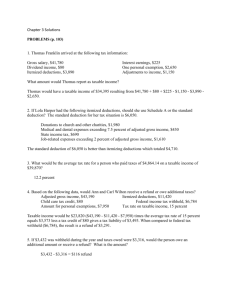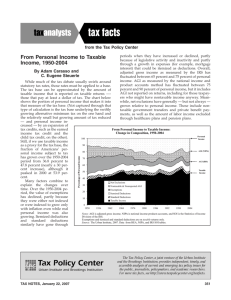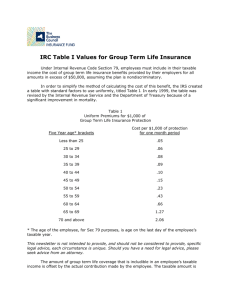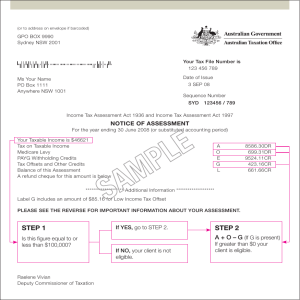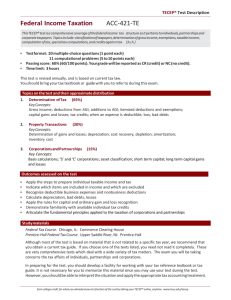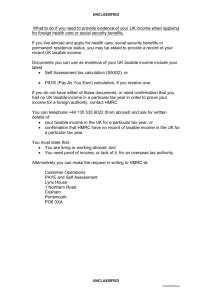Individual income tax rates - Sydney Accounting Services Pty Ltd.
advertisement
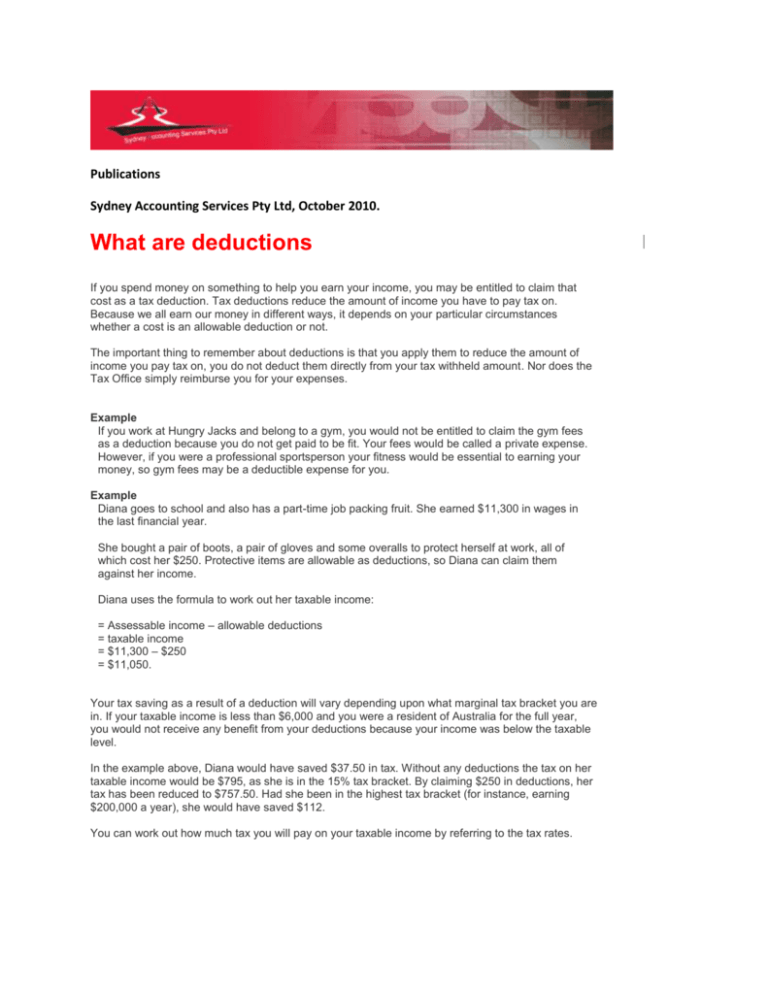
Publications Sydney Accounting Services Pty Ltd, October 2010. What are deductions If you spend money on something to help you earn your income, you may be entitled to claim that cost as a tax deduction. Tax deductions reduce the amount of income you have to pay tax on. Because we all earn our money in different ways, it depends on your particular circumstances whether a cost is an allowable deduction or not. The important thing to remember about deductions is that you apply them to reduce the amount of income you pay tax on, you do not deduct them directly from your tax withheld amount. Nor does the Tax Office simply reimburse you for your expenses. Example If you work at Hungry Jacks and belong to a gym, you would not be entitled to claim the gym fees as a deduction because you do not get paid to be fit. Your fees would be called a private expense. However, if you were a professional sportsperson your fitness would be essential to earning your money, so gym fees may be a deductible expense for you. Example Diana goes to school and also has a part-time job packing fruit. She earned $11,300 in wages in the last financial year. She bought a pair of boots, a pair of gloves and some overalls to protect herself at work, all of which cost her $250. Protective items are allowable as deductions, so Diana can claim them against her income. Diana uses the formula to work out her taxable income: = Assessable income – allowable deductions = taxable income = $11,300 – $250 = $11,050. Your tax saving as a result of a deduction will vary depending upon what marginal tax bracket you are in. If your taxable income is less than $6,000 and you were a resident of Australia for the full year, you would not receive any benefit from your deductions because your income was below the taxable level. In the example above, Diana would have saved $37.50 in tax. Without any deductions the tax on her taxable income would be $795, as she is in the 15% tax bracket. By claiming $250 in deductions, her tax has been reduced to $757.50. Had she been in the highest tax bracket (for instance, earning $200,000 a year), she would have saved $112. You can work out how much tax you will pay on your taxable income by referring to the tax rates. Individual income tax rates Residents These rates apply to individuals who are residents of Australia for tax purposes (see Residency - overview for more information). Tax rates 2009–10 Taxable income Tax on this income 0 – $6,000 Nil $6,001 – $35,000 15c for each $1 over $6,000 $35,001 – $80,000 $4,350 plus 30c for each $1 over $35,000 $80,001 – $180,000 $17,850 plus 38c for each $1 over $80,000 $180,001 and over $55,850 plus 45c for each $1 over $180,000 The above rates do not include the Medicare levy of 1.5% (read Medicare levy reduction or exemption for more information). Tax offsets reduce the tax payable. Tax offsets based on taxable income levels apply to a range of circumstances. For more information read About tax offsets. The following rates for 2010–11 apply from 1 July 2010. Tax rates 2010–11 Taxable income Tax on this income 0 – $6,000 Nil $6,001 – $37,000 15c for each $1 over $6,000 $37,001 – $80,000 $4,650 plus 30c for each $1 over $37,000 $80,001 – $180,000 $17,550 plus 37c for each $1 over $80,000 $180,001 and over $54,550 plus 45c for each $1 over $180,000 Non-residents If you are a non-resident for the full year, the following rates apply: Tax rates 2009–10 Taxable income Tax on this income 0 – $35,000 29c for each $1 $35,001 – $80,000 $10,150 plus 30c for each $1 over $35,000 $80,001 – $180,000 $23,650 plus 38c for each $1 over $80,000 $180,001 and over $61,650 plus 45c for each $1 over $180,000 Non-residents are not required to pay the Medicare levy. The following rates for 2010–11 apply from 1 July 2010. Tax rates 2010–11 Taxable income Tax on this income 0 – $37,000 29c for each $1 $37,001 – $80,000 $10,730 plus 30c for each $1 over $37,000 $80,001 – $180,000 $23,630 plus 37c for each $1 over $80,000 $180,001 and over $60,630 plus 45c for each $1 over $180,000 Children If you are under the age of 18, and receive ‘unearned’ income (for example, investment income), rates apply. Contact us: Sydney Accounting Services Pty Ltd welcomes your enquiry and can meet with you at a time of your convenience. Email: info@sydas.com.au Telephone: +61 2 9564 0092 Facsimile: +61 2 9564 0093 Office Address: Shop 1/420 New Canterbury Rd Dulwich Hill NSW 2203 Postal Address: PO Box 61 Dulwich Hill NSW 2203 Office Hours: Monday – Friday 9.00am -5.30pm (Saturday by Appointment) Sydney Accounting Services Pty Ltd ABN: 47 091 976 751 Notes: ___________________________________________________________________ ___________________________________________________________________ ___________________________________________________________________ ___________________________________________________________________ ___________________________________________________________________ ___________________________________________________________________ ___________________________________________________________________ ___________________________________________________________________ ___________________________________________________________________ ___________________________________________________________________ ___________________________________________________________________ ___________________________________________________________________

